Kicking the habit: The drug addicts who nearly lost it all
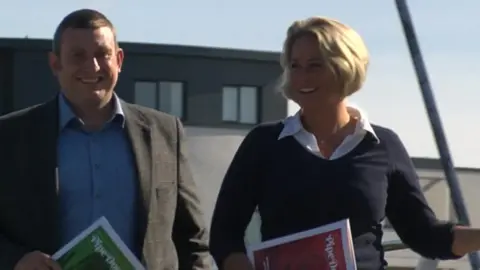 BBC
BBCTwo strangers, one thing in common - a drug addiction that threatened to destroy their families and almost cost them their lives.
Araminta Jonsson, 31, used cocaine to cope with bad relationships and help mask her feelings of self-loathing.
While the death of 35-year-old Alex Drummond's mother saw his recreational drug use spiral out of control and led to the breakdown of his marriage.
Now, after a chance encounter, they run a magazine on tackling addiction.
Here, in their own words, they tell their stories.

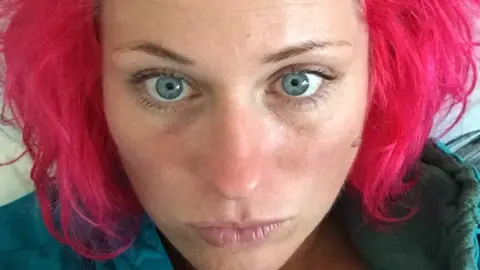 Araminta Jonsson
Araminta JonssonI love my son but the idea of my son or a crack pipe - I couldn't not choose the crack pipe.
I can't really explain it, it just became like I had no choice.
It started in my teens, I was unhappy and uncomfortable in my skin. I had this ego that was up here and self-esteem that was down there.
I went through relationships, trying to get validation - needing other people to make me feel good about myself.
I had an inability to like myself. There wasn't a particular reason for it, that's just how it was for me.
I never even drank sensibly. The first time I ever had a drink, I was 13 years old and I poured a pint of gin, held my nose and downed it.
That's how I drank from a young age and that's just not normal, but I didn't know my behaviour was abnormal for a long time.
I did an undergraduate degree at University College London and did the partying thing.
I'd get out of control, get into a relationship and feel good about myself for a little bit, then that would stop working and I'd pick up drugs or alcohol again. That would be the pattern.
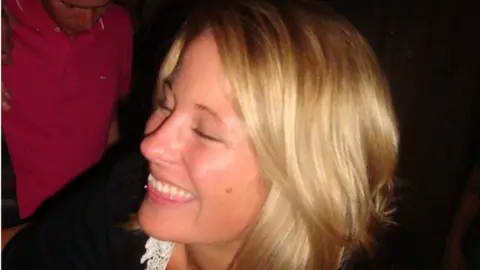 Araminta Jonsson
Araminta JonssonI moved to Spain for a bit, lived there and worked as a teacher for a few years. I was in a relationship and those were some good years.
And then I went to university, I was working in the day, going to night school and using drugs all night to keep myself up and get my writing in on time.
After that I moved to Colombia which was a disastrous move.
I was a cocaine addict and the idea of going out with a Colombian [boyfriend] meant it was easier for me to facilitate my drug use.
I finished my masters' degree and said I was going to go to Colombia to write a book but the only reason I went was to use more drugs, cheaper.
But I got really, really sick when I was there, I started taking all sorts of prescription drugs, started having hallucinations.
It got to the point where I couldn't move from my bed to my bathroom on my own because my muscles had wasted away.
I tried to get home and I collapsed in the airport and woke up in a Colombian hospital. They wouldn't let me on a flight and so I got stuck in Colombia for a while.
I honestly thought I was going to die at that time.
I tried to sort myself out and a couple of months later I got back, my parents had to pay for my flight, but I didn't tell them.
I didn't tell anyone, I just moved to London and slept on a friend's sofa and my using decreased purely because of the cost.
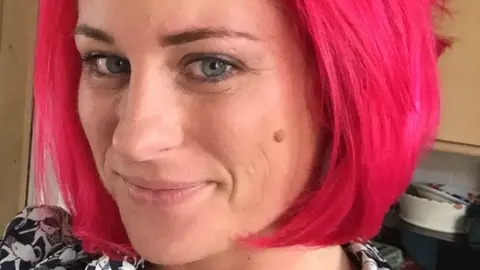 Araminta Jonsson
Araminta JonssonI wanted to stop, I was desperate to stop, I knew I had a problem. I went to the NHS, did all the things they tell you to do and nothing worked.
I tried everything and then I found out I was pregnant. I'd been using heavily so I was really fortunate I didn't lose the baby.
I stopped that day - I stopped drinking, I stopped smoking and I stopped using.
Again, it was a temporary fix, thinking 'this is the thing that's going to fix me, this is going to make me better'.
I set up a childcare business but I later broke up with the baby's dad and everything started disintegrating.
I was drinking heavily and I went home to Abergavenny for Christmas and my family noticed I was in an absolute state.
I was bloated and was basically having a nervous breakdown, so I checked myself into rehab.
I went there for 10 weeks and it was great. I put down the drink, put down the drugs and thought 'this is it, I've got all the tools to fix me'. But in rehab, what I picked up was a man.
They really advise you not to do that and I did spend six months clean and sober with him. But he was a crack addict.
Cocaine and alcohol had always been my drug before, so when we relapsed on crack I thought 'this will be all right, it's not my drug of choice, I'm not going to get addicted'.
But it got really messy, the relationship got really abusive, there was a lot of violence.
I tried to keep my son out of it for as much as possible but by the last month it was just out of control. The last day [we were together] my son saw me getting beaten up and he was screaming 'Mummy, mummy, get off mummy'.
The police were called, I almost lost my son through it.
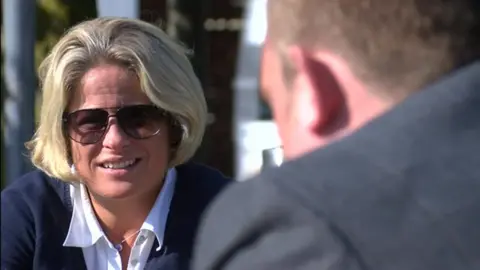
I got myself in a lot of debt - you don't even want to think about it. I had a house and a business - that's gone.
Any savings I had went, I had loans, I still owe money on credit cards, I still owe money on overdrafts - it's absolutely devastating.
I got brought back here and I said 'this is it, enough is enough now' and since then I've been clean and sober.
Drugs used to numb everything. My brain works so fast, I'm constantly over thinking everything, everything is like a drama in my head and I think drugs took me away from that.
Now I'm in recovery I've learnt that meditation does the same. Giving myself some time, doing things for me has helped.
It's all thanks to having a focus, which for me is Pipe Down - a magazine I set up written for addicts, by addicts. It's giving me a reason and purpose to get up in the day.
People could say 'you've got your son, you've got your family' and yes, I have all that, but I needed something that filled my self esteem, something that gave me self worth.
And I'm being given that by regularly contributing to this magazine and, hopefully, doing something that's going to help other people.

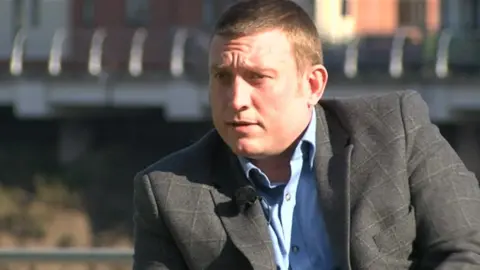
At my lowest point, I tried to end my life.
I had my daughter there, who I could see if I wasn't in addiction or wasn't using - the daughter we tried for eight years for - and I had a bag of cocaine and I would choose that every time.
It would just lead me to feeling so guilty and so shameful that I would then want to numb those emotions and that would be the cycle.
I used to run nightclubs so I kind of did the whole recreational drugs thing - experimented with ecstasy, MDMA, ketamine, that kind of stuff.
I did that for a number of years but it became more of a problem when my mum passed away about three years ago.
Because of my experience of using drugs recreationally, I knew it would give me a sort of numbness of my emotions.
Cocaine was my problem and I would use it every time I was feeling down. It would be my go-to mechanism and I just ended up in this cycle where I got used to using it.
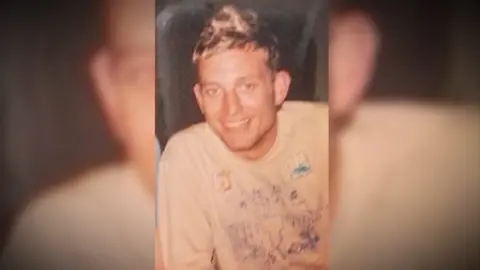 Alex Drummond
Alex DrummondThere was a lot going on in my life. I was running a couple of successful businesses in Cardiff, I was trying for a baby through IVF and when eventually my wife did get pregnant, I couldn't stop.
I went into rehab for 16 weeks and when I came out I thought I knew everything, all I needed to know to crack it.
But it wasn't long before it all led back down the same path because I hadn't really learnt how to deal with my emotions.
As soon as any kind of trauma entered my life - that being the breakup of my marriage - it just led me down that path again.
Drugs gives you a sense of oblivion and take you away from having to think about what it is you don't want to think about.
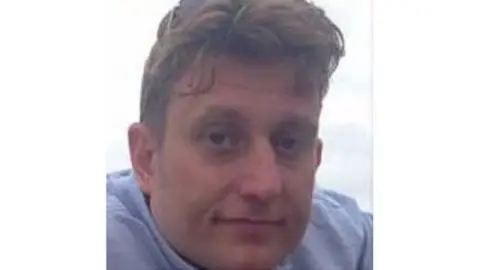 Alex Drummond
Alex DrummondI didn't really care whether I died until I went into rehab for the second time.
I ended up at Brynawel House in south Wales. I was funded to go in there the first time but the second time they wouldn't fund me because I hadn't been attending any substance misuse services.
I managed to get someone to fund me, to go in for four weeks, and, luckily, I saw a copy of the magazine Pipe Down there.
I had a journal I was writing and I sent it in, that's how Araminta and I kind of collaborated.
I've been out now for four months and I'm clean. The chaos in my head has gone and I've just got a completely different perspective on life.
When you come out of rehab, or any kind of institution or treatment centre, you're at a T-junction and, unfortunately, [sometimes] the services aren't there for you in some areas.
Your motivation is at its highest because you've had a spell of a couple of months clean. You think you're a little bit bulletproof, you're super-confident but the reality is, as an ex-addict, you're going to find it difficult to get into the workplace.
So for me, to come out and have an immediate channel to talk about my addiction - contributing towards the magazine - I felt like I had that sense of self-worth again, because it had completely gone.
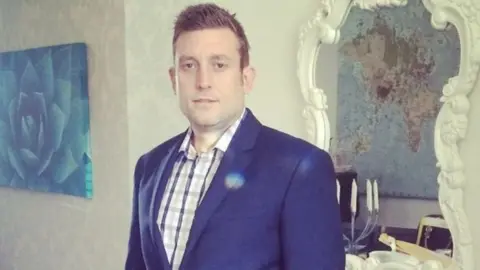 Alex Drummond
Alex DrummondThe fact it started from a journal and now has translated to a magazine, should give hope to people that are in a similar position.
I mean, I lost everything. I'm still in a massive amount of debt, my marriage broke up, but I'm starting to rebuild my relationship with my daughter, which is great.
With the magazine, we want to work with companies and businesses who are prepared to give people in addiction, who are in recovery, a second chance.
Some of the most talented people I've met have been involved in addiction and they shouldn't just be written off.
